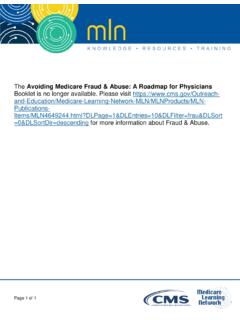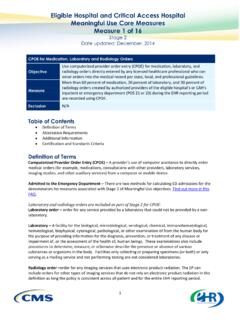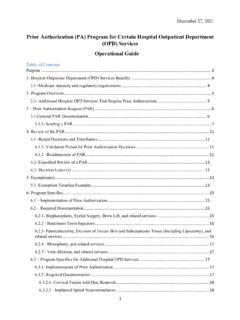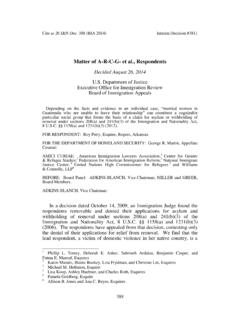Transcription of Prior Authorization (General) 1. - CMS
1 1 December 27, 2021 Prior Authorization Process for Certain Hospital Outpatient Department (OPD) Services Frequently Asked Questions (FAQs) Prior Authorization (General) 1. Q: What is Prior Authorization ? A: Prior Authorization is a process through which a request for provisional affirmation of coverage is submitted for review before the service is rendered to a beneficiary and before a claim is submitted for payment. The Prior Authorization program for certain hospital OPD services ensures that Medicare beneficiaries continue to receive medically necessary care while protecting the Medicare Trust Funds from unnecessary increases in the volume of covered services and improper payments. The Prior Authorization process does not alter existing medical necessity documentation requirements. Prior Authorization helps to make sure that applicable coverage, payment, and coding requirements are met before services are rendered while ensuring access to and quality of care.
2 2. Q: When did the Prior Authorization Process for OPD Services begin? A: Prior Authorization for the initial five services (blepharoplasty, botulinum toxin injections, panniculectomy, rhinoplasty, and vein ablation) started on June 17, 2020 for dates of service on or after July 1, 2020. Two new additional hospital OPD services (cervical fusion with disc removal and implanted spinal neurostimulators) will require Prior Authorization for dates of service on or after July 1, 2021. 3. Q: What services require Prior Authorization under this process? A: As part of the Calendar Year 2020 OPPS/ASC Final Rule (CMS-1717-FC), CMS required Prior Authorization for the following services: blepharoplasty, botulinum toxin injections, panniculectomy, rhinoplasty, and vein ablation. As part of the Calendar Year 2021 OPPS/ASC Final Rule (CMS-1736-FC), CMS will require Prior Authorization for two additional services: cervical fusion with disc removal and implanted spinal neurostimulators.
3 The Final List of Outpatient Services that Require Prior Authorization is located here. 4. Q: What codes require Prior Authorization for implanted spinal neurostimulators? A: CMS will only require Prior Authorization for CPT code 63650 (Implantation of spinal neurostimulator electrodes, accessed through the skin) at this time. CMS is temporarily removing CPT codes 63685 and 63688 from the list of OPD services that require Prior Authorization . 5. Q: Why is CMS temporarily removing CPT codes 63685 and 63688 from 2 December 27, 2021 the list of OPD services that require Prior Authorization ? A: CMS is temporarily removing CPTs 63685 and 63688 to streamline requirements for the initial implementation of Prior Authorization for implanted spinal neurostimulators. CMS will monitor Prior Authorization for CPT 63650 to determine if it is effective in reducing the volume of unnecessary implanted spinal neurostimulator services.
4 6. Q: When will CMS announce any changes with respect to these two codes and whether they require Prior Authorization ? A: CMS will monitor Prior Authorization for CPT 63650 and will provide public notice if there are any changes to the Prior Authorization requirements for CPTs 63685 and 63688. 7. Q: Is Prior Authorization required for both the trial and the permanent implantation procedures for CPT 63650? A: No. Providers who plan to perform both the trial and permanent implantation procedures using CPT 63650 in the hospital OPD will only require Prior Authorization for the trial procedure. To avoid a claim denial, providers must place the Unique Tracking Number (UTN) received for the trial procedure on the claim submitted for the permanent implantation procedure. When the trial is rendered in a setting other than hospital OPD, providers will need to request Prior Authorization for CPT 63650 as part of the permanent implantation procedure in the hospital OPD.
5 8. Q: Why is Medicare implementing Prior Authorization for these OPD Services? A: The CMS has observed significant increases in the utilization volume of some covered OPD services. During our analysis of the five original services, we targeted services that represent procedures that are likely to be cosmetic surgical procedures and/or are directly related to cosmetic surgical procedures that are not covered by Medicare but may be combined with or masquerading as therapeutic services. As part of our responsibility to protect the Medicare Trust Funds, we continually analyze data to determine if there are additional covered OPD services that are exhibiting unnecessary increases in volume for which Prior Authorization would be appropriate. We believe Prior Authorization for these two new services (cervical fusion with disc removal and implanted spinal neurostimulators) will be an effective method for controlling unnecessary increases in volume and will reduce instances in which Medicare pays for services that do not meet Medicare requirements.
6 9. Q: How does Prior Authorization help Medicare suppliers, providers, and other practitioners? A: Suppliers, providers, and other Medicare practitioners can be confident that the items and services that their patients need will be covered without time delays, subsequent paperwork, or the need to file an appeal for a claim that was later deemed not payable. In 3 December 27, 2021 addition, paid claims for which there is an associated provisional affirmation decision will be afforded some protection from future audits. 10. Q: Does this Prior Authorization process protect beneficiary access to care? A: Yes. The CMS believes this Prior Authorization program will both help protect the Medicare Trust Funds from improper payments and make sure beneficiaries are not hindered from accessing necessary services when they need them. Prior Authorization allows CMS to make sure items and services frequently subject to unnecessary utilization are furnished or provided in compliance with applicable Medicare coverage, coding, and payment rules before they are furnished or provided.
7 It also allows the beneficiary to be notified if the item or service would be covered by Medicare and any potential financial implications earlier in the payment process. Access is preserved by having set timeframes for contractors to complete any Prior Authorization request decisions, and an expedited process is available in cases where delays may jeopardize the life or health of beneficiaries. 11. Q: Who will be required to submit Prior Authorization requests? A: Hospital OPDs must submit a Prior Authorization request and receive a provisional affirmation decision as a condition of payment. Physicians and other third parties may submit the request on behalf of the hospital OPD, but hospital OPDs are responsible for ensuring that this condition of payment is met. Claims for these services submitted without a provisional affirmation decision will be denied. 12. Q: What provider types require Prior Authorization for these services?
8 A: Only hospital OPD services require Prior Authorization as part of this program. Other facility/provider types such as physician s offices, critical access hospitals, or ambulatory surgery centers that submit claims other than type of bill 13X are not required to submit Prior Authorization requests. 13. Q: Are emergency department services subject to Prior Authorization ? A: No. CMS excludes the Emergency Department services from Prior Authorization requirements when an outpatient service is submitted with an ET modifier or 045x revenue code. These claims are not excluded from future pre-payment or postpayment medical review . 14. Q: Does the Prior Authorization requirement apply to Maryland waiver hospitals? A: Yes. The Maryland hospital waiver does not affect their OPD requirement to participate in this program. Maryland OPDs are required to submit Prior Authorization requests for the services listed in this program.
9 4 December 27, 2021 15. Q: Where can I find the regulations implementing the Hospital OPD Prior Authorization process? A: The regulations are located at 42 CFR 16. Q: Where can I find additional operational details related to Prior Authorization ? A: An operational guide with additional details is available within the download section on the OPD Prior Authorization website. Prior Authorization Request Process 17. Q: What form do I use to submit a Prior Authorization request and is it available on the website? A: There is no specific form to request Prior Authorization . Your Medicare Administrative Contractor (MAC) may make a cover sheet or other templates available for voluntary use. 18. Q: How can providers submit Prior Authorization requests/what methods can be used? A: Providers can submit Prior Authorization requests to their respective MAC by all of the following methods: fax, mail, Electronic Submission of Medical Documentation (esMD), and MAC electronic portals.
10 For more information about esMD, see or contact your MAC. 19. Q: How many days will it take to receive a Prior Authorization decision ? A: The standard review timeframe is up to ten (10) business days from the date the Prior Authorization request is received, excluding federal holidays. 20. Q: What if I need a decision on my Prior Authorization request sooner than 10 days? A: You can request an expedited review timeframe of up to two (2) business days if the standard timeframe for making a decision could seriously jeopardize the life or health of the beneficiary. The expedited request must include justification showing that the standard timeframe would not be appropriate. If the MAC determines that the request does not substantiate the need for an expedited review , they will provide notification and communicate a decision within the regular timeframe. 21. Q: Do the botulinum toxin J-codes listed in this program require Prior Authorization when they are used for injection procedures other than 64612 and 64615?













